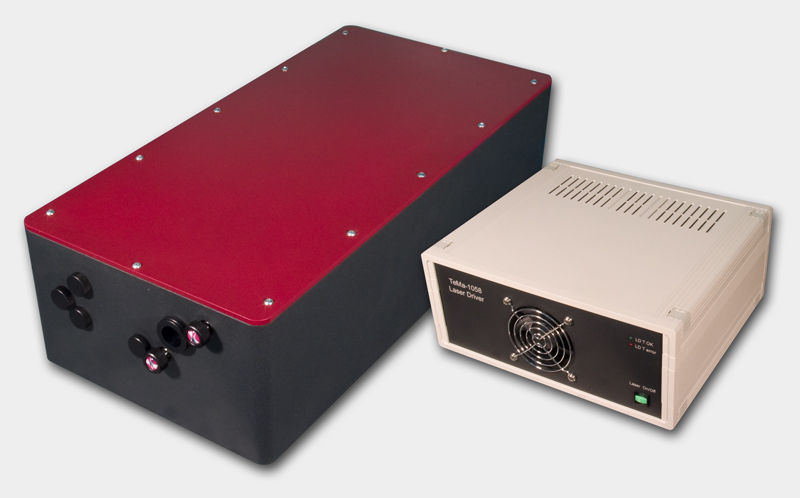
The Yb-doped Tourmaline Yb-SS laser radiates at 1058±2 nm with more than 1 W of average power, and enables the user to enjoy Ti:Sapphire level power at over-micron wavelengths. This new design from Del Mar's engineers features an integrated pump diode module for greater system stability and turn-key operation. The solid bulk body of the laser ensures maximum rigidity, while self-starting design provides for easy "plug-and-play" operation.
Laser for second harmonic imaging in the retina with the voltage sensitive dye FM4-64
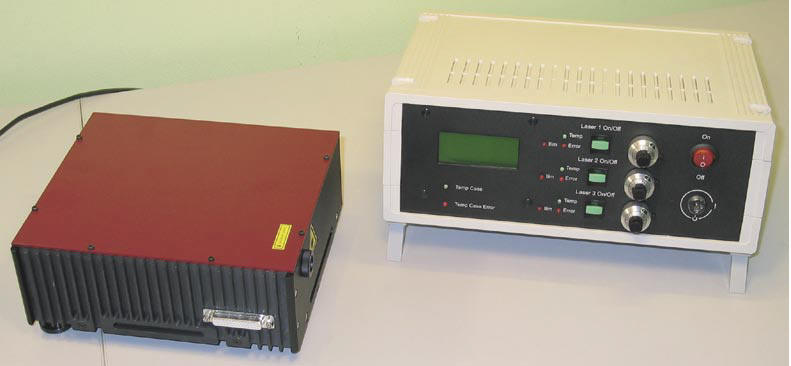
780 nm and 1560 nm Femtosecond Fiber Laser
Buccaneer SHG
160/80 -
Buccaneer SHG 300/120
Femtosecond Fiber Laser with SH Generation
Wavelength (switchable): 780±5 nm (fixed) or 1560±10 nm (fixed)
Pulse Width (FWHM): <120 fs
Power output (switchable apertures):
>80 mW, 780 nm, TEM00, linearly polarized or
>160 mW, 1560 nm, TEM00, linearly polarized
Repetition rate: 70 MHz
Spatial mode: TEMoo
RF SYNC out: SMA connector (200-300 mV@50 ohm load)
Mode lock status: SMA connector (3.5/0 V) and LED
For applications in Amplifier systems seeding, Terahertz generation and
detection, Multi-photon microscopy, Ultrafast spectroscopy, Semiconductor device
characterization, Supercontinuum generation, Optical coherence tomography,
Telecommunications , Micromachining, Nonlinear Bioimaging (SHG imaging), THz
spectroscopy, Education
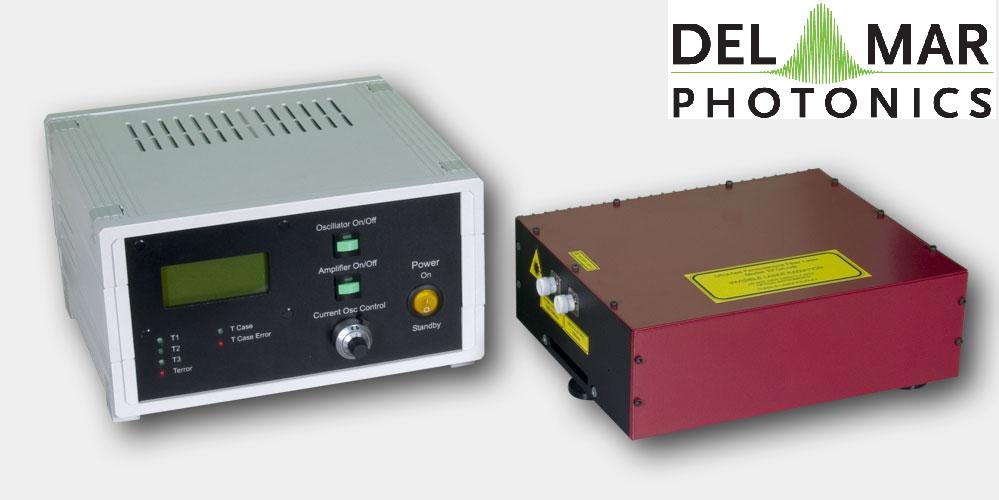
Femtosecond pulsed lasers are used in many fields of physics, biology, medicine and many other natural sciences and applications: material processing, multiphoton microscopy, «pump-probe» spectroscopy, parametric generation and optical frequency metrology. Femtosecond fiber lasers offer stable and steady operation without constant realignment.
The Pearl-70P300 laser comprises: a passively mode-locked fiber laser, providing pulses with repetition rate 60 MHz and having duration of 250-5000 fs, an amplifier based on Er3+ doped fiber waveguide with pumping by two laser diodes, a prism compressor for amplified pulse compression.
Pearl Ultra-Compact Ultrafast Picosecond Fiber Oscillator
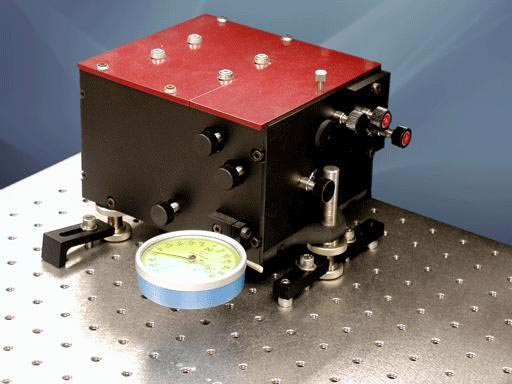
The autocorrelation technique is the most common method used to determine laser pulse width characteristics on a femtosecond time scale.
The basic optical configuration of the autocorrelator is similar to that of an interferometer (Figure.1). An incoming pulse train is split into two beams of equal intensity. An adjustable optical delay is inserted into one of the arms. The two beams are then recombined within a nonlinear material (semiconductor) for two photon absorption (TPA). The incident pulses directly generate a nonlinear TPA photocurrent in the semiconductor, and the detection of this photocurrent as a function of interferometer optical delay between the interacting pulses yields the pulse autocorrelation function. The TPA process is polarization-independent and non-phasematched, simplifying alignment.
Reef-RT autocorrelator measures laser pulse durations ranging from 20 femtoseconds to picosecond regime. It measures pulse widths from both low energy, high repetition rate oscillators and high energy, low repetition rate amplifiers. Compact control unit operates autocorrelator head and optional spectrometer through on-screen menus. Autocorrelation trace and spectrum can be displayed and analyzed on screen or downloaded to remote computer.
New: Reef-20DDR autocorrelator - Multishot-FROG for femtosecond fiber laser oscillator and amplifier
Collinear (interferometric) autocorrelation for 1300-2000 nm wavelength range
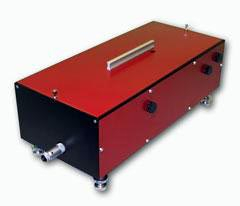
Trestles Fourth Harmonic Generator - request a quote
Trestles FHG is designed to work with Ti:sapphire lasers, such as the Trestles Ti:sapphire laser to provide fourth harmonic generation. Trestles FHG is an affordable and easy solution to generating pulses around 200 nm.
Trestles FHG is available in two versions. The first version uses the third harmonic mixed with the fundamental wavelength to produce fourth harmonic generation. This option provides the fundamental, as well as the second, third and fourth harmonics. For input of 810 nm, 1 W, 82MHz and 50 fs, output of the fourth harmonic is at 203 nm, 300-400 fs and power is 3 mW. The second option uses two separate second harmonic generation stages to produce fourth harmonic generation. With input of 810 nm, 1 W, 82 MHz and 50 fs, output of the fourth harmonic is at 210 nm, pulse width of 500 fs and power of 10 mW.
The Trestles FHG from Del Mar Photonics is an easily installed solution for adding functionality to any femtosecond laser system. Extended ranges will increase capabilities for research, and specific applications such as microscopy and spectroscopy.

Near IR viewers
High performance infrared
monocular viewers are designed to observe radiation emitted by
infrared sources. They can be used to observe indirect radiation of IR
LED's and diode lasers, Nd:YAG, Ti:Sapphire, Cr:Forsterite, dye lasers and
other laser sources. IR viewers are ideal for applications involving the
alignment of infrared laser beams and of optical components in
near-infrared systems. Near IR viewers
sensitive to laser radiation up to 2000 nm.
The light weight, compact monocular may be used as a hand-held or facemask
mounted for hands free operation.
Ultraviolet viewers are designed to observe radiation emitted by UV sources.
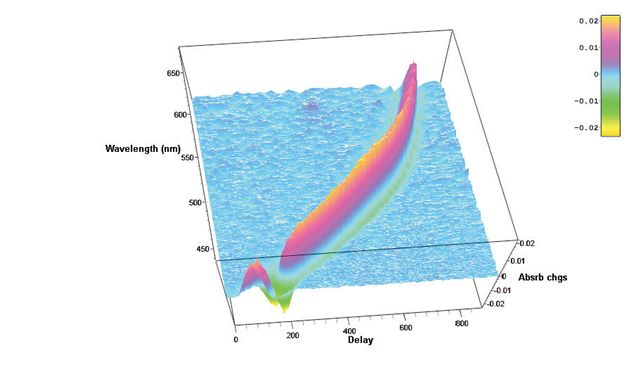
Future nanostructures and biological nanosystems will take advantage not only of the small dimensions of the objects but of the specific way of interaction between nano-objects. The interactions of building blocks within these nanosystems will be studied and optimized on the femtosecond time scale - says Sergey Egorov, President and CEO of Del Mar Photonics, Inc. Thus we put a lot of our efforts and resources into the development of new Ultrafast Dynamics Tools such as our Femtosecond Transient Absorption Measurements system Hatteras. Whether you want to create a new photovoltaic system that will efficiently convert photon energy in charge separation, or build a molecular complex that will dump photon energy into local heat to kill cancer cells, or create a new fluorescent probe for FRET microscopy, understanding of internal dynamics on femtosecond time scale is utterly important and requires advanced measurement techniques.
Reserve a
spot in our Ultrafast Dynamics Tools
training workshop in San Diego, California.
Beacon Femtosecond Optically Gated Fluorescence Kinetic Measurement System
-
request a quote -
pdf
Beacon together with Trestles Ti:sapphire oscillator, second and third harmonic
generators. Femtosecond optical gating (FOG) method gives best temporal
resolution in light-induced fluorescence lifetime measurements. The resolution
is determined by a temporal width of femtosecond optical gate pulse and doesn't
depend on the detector response function. Sum frequency generation (also called
upconversion) in nonlinear optical crystal is used as a gating method in the
Beacon femtosecond fluorescence kinetic measurement system. We offer
Beacon-DX for operation together with Ti: sapphire femtosecond oscillators
and Beacon-DA for operation together with femtosecond amplified pulses.
Beacon Trestles -
Beacon PHAROS
Reserve a
spot in our Ultrafast Dynamics Tools
training workshop in San Diego, California.